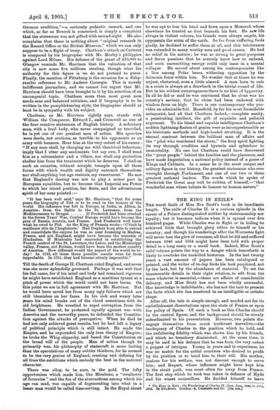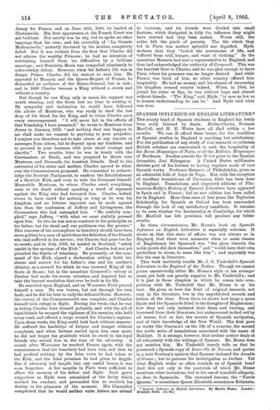THE worst fault of Miss Eva Scott's book is its
inordinate length. The exile of Charles IL is a curious episode in the career of a Prince distinguished neither by statesmanship nor loyalty; but it becomes tedious when it is spread over five hundred pages. While Charles was in flight or in hiding he achieved little that brought glory either to himself or his country; and though his wanderings after the Worcester fight will never lose the glow of romance, all that he did and suffered between 1646 and 1654 might have been told with proper detail in a long essay or a small book. Indeed, Miss Scott's solid volume points the way to a danger which henceforth is likely to overtake the unskilled historian. In the last twenty years a vast amount of papers has been catalogued or printed, and the writer of to-day finds his task perplexed, not by the lack, but by the abundance of material. To set the innumerable details in their right relation, to sift from the mass whatever is essential,—these are affairs of considerable delicacy, and Miss Scott has not been wholly successful. Her knowledge is indubitable ; she has not the tact to present the facts which she has mastered in an intelligible or artistic shape.
After all, the tale is simple enough, and needed not for its embellishment dissertations upon the state of France or upon the policy of Spain. Of such a book as this Charles should be the central figure, and the background should be sternly subordinated to his presentation. However, two points dis- engage themselves from much irrelevant narrative,—the inadequacy of Charles to the position which he. held, and the unfaltering fidelity which was shown him by his friends, and which no treachery diminished. At the same time, it may be said in his defence that he was from the very outset a puppet of intrigue. Young in years and in experience, he was no match for the artful courtiers who desired to profit by his position or to bend him to their wilL His mother, zealous for his welfare, was not discreet enough to serve him ; and Rupert, whose influence might have kept him in the strait path, was most often far away from France. The first step which he took was taken in defiance of Hyde and his wisest counsellors. He decided himself to leave
* The King in Exit.: Wandoings of Chariot II. from Tune, 1545, to July, 3851. By Ent poott. Lohdon : A. Constable and Co. [me. net.]
Jersey for France, and on June 26th, 1646, he landed at Coutainville. His first appearance at the French Court was not brilliant. Not merely was he shy, but he spoke no other language than his own; and his courtship of "La Grande Mademoiselle," ardently favoured by his mother, completely failed. But it was evident from the first that Charles did not admire the wealthy Princess ; he had no intention of extricating himself from his difficulties by a brilliant marriage; and Henrietta Maria was compelled reluctantly to acknowledge defeat. However, when his father's life was in danger Prince Charles did his utmost to save him. He appealed to Mazarin and the Queen-Regent of France, he demanded an audience of the States-General, but in vain ; and in 1649 Charles became a King without a crown and without a country.
But though he was King only in name, his support was worth winning, and the Scots lost no time in seeking it. By sympathy and inclination he would have followed the advice of Montrose, who was ready to shed the last drop of his blood for his King, and to whom Charles gave every encouragement. "I will never fail in the effects of that friendship I have promised," he wrote to Montrose from Jersey in January, 1650, "and nothing that can happen to me shall make me consent to anything to your prejudice. I conjure you therefore not to take alarm at any reports or messages from others, but to depend upon my kindness, and to proceed in your business with your usual courage and alacrity." Two months later he was in treaty with the Covenanters at Breda, and was prepared to throw over Montrose and Ormonde, his trustiest friends. Deaf to the entreaties of his sister and mother, Charles agreed to what- ever the Commissioners proposed. He consented to acknow- ledge the Scottish Parliament, to confirm the Establishment of a Scottish Kirk, and even to take the Covenant himself. Meanwhile Montrose, to whom Charles owed everything, went to his death without speaking a word of reproach against the King who had betrayed him. Charles, indeed, seems to have cared for nothing so long as be won his kingdom, and no bitterer reproach can be made against him than the confession of Jaffery and Livingstone, the Covenanters who had entangled him. "He sinfully com- plied," says Jaffery, "with what we most sinfully pressed upon him. In this he was not so constant to his principles as his father, but his strait and our guiltiness was the greater." This remorse of his accomplices in treachery should have been more galling to a man of spirit than the defection of the friends who had suffered in his service ; but Charles had gone too far to recede, and in July, 1650, he landed in Scotland, "safely catcht in the springe of the Kirk." And Charles had not yet plumbed the depths of treachery. He presently, at the com- mand of the Kirk, signed a declaration setting forth his shame and sorrow for his father's sins and his mother's idolatry, as a reward for which he was crowned King of the Scots at Scone ; but in the meantime Cromwell's victory at Dunbar had made his crown valueless, and inspired him to take the bravest resolution that ever he took in his life.
He marched upon England, and on Worcester Field proved himself a man. He was beaten, but not through his own fault, and he did his best to rally the defeated Scots. However, the victory of the Commonwealth was complete, and Charles himself took refuge in flight. During the weeks that he was in hiding Charles bore himself gallantly, and with the aid of loyal friends he escaped the vigilance of his enemies, who held every road, and offered a large reward for Charles's capture. Upon these weeks the King could look back without remorse. He suffered the hardships of fatigue and hunger without complaint, and when fortune smiled upon him once more, he did not forget the gratitude which he owed to the loyal friends who served him in the time of his adversity. A month after Worcester he reached France again, with the consciousness that his treachery had been vain, and that he had profited nothing by the false vows he had taken to the Kirk, and the false promises he had given to Argyle. But if adversity had taught him any useful lesson, it was soon forgotten. A few months in Paris were sufficient to efface the memory of his defeat and flight. Such grave supporters as Hyde were astonished at the levity which marked his conduct, and persuaded him to overlook his destiny in the pleasures of the moment. His Chancellor complained that he would neither write letters nor attend to business, and his friends were divided into small factions, which dissipated in folly the influence they might have exerted had they been united. Worse still, the exiles felt the pinch of poverty. The life which they led in Paris was neither splendid nor dignified. Hyde declares that they "lacked the necessaries of life, and Buffered from cold, hunger, and want of clothing." In the meantime Mazarin had sent a representative to England, and thus had acknowledged the authority of Cromwell. This was the heaviest blow to Charles, and he was glad enough to leave Paris, where his presence was no longer desired. And while France was tired of him, no other country offered him hospitality. He had no money, and his chance of recovering his kingdom seemed remote indeed. When, in 1654, he joined his sister at Spa, he was without hope and almost without friends. "The King," said Hyde, "is now as low as to human understanding he can be." And Hyde said what was true.











































 Previous page
Previous page